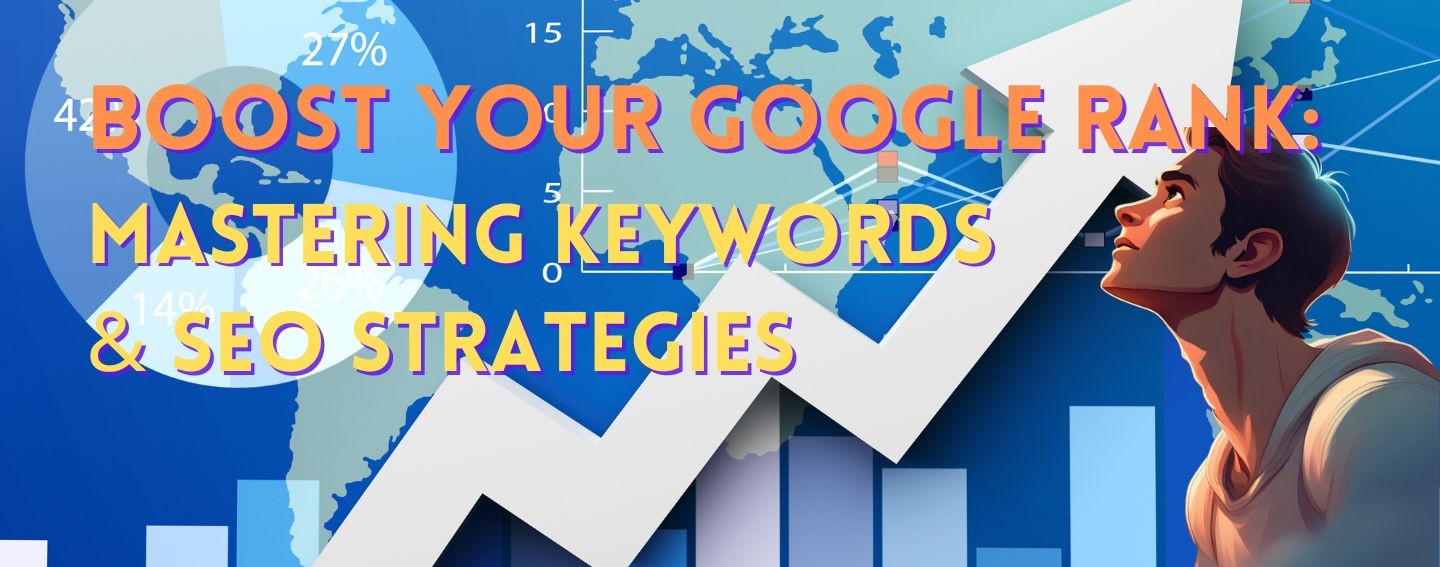Boost Your Google Rank: Mastering Keywords & SEO Strategies

Navigating the digital marketing landscape to secure a prime position in Google's search outcomes is akin to discovering treasure. It's not merely about being seen; it's about affirming your website as a trustworthy information source, drawing in more visitors, and ultimately, converting those visitors into devoted customers. But how do you enhance your Google rankings for your chosen keywords? And crucially, how do you pinpoint the most effective keywords for your website?
Deciphering SEO and Its Significance
Search Engine Optimisation (SEO) is the craft and science of refining your online website content so that a search engine prefers to display it as a top result for searches of a specific keyword. SEO is vital because it enhances your website's visibility, leading to more traffic and more opportunities to transform prospects into customers.
Identifying Your Optimal Keywords
Before optimising your website, you need to identify which keywords you aim to rank for. Discovering the optimal keywords for your website involves understanding your audience, analysing your competition, and utilising the right tools.
- Understand Your Audience: Grasp the language your target audience utilises when searching for your products or services. This involves adopting the perspective of your potential customers.
- Analyse Your Competitors: Examine the keywords your competitors are targeting. Tools like SEMrush and Ahrefs can assist you in identifying which keywords are driving traffic to their sites.
- Leverage Keyword Research Tools: Tools such as Google Keyword Planner, Moz Keyword Explorer, and Ubersuggest can help you find keywords related to your business, along with their search volume and competition level.
- Prioritise Long-Tail Keywords: These are lengthier and more specific keyword phrases that visitors are more likely to use when they're close to making a purchase or when using voice search.
Enhancing Google Listings for Your Keywords
Having pinpointed your best keywords, it's time to optimise your website to boost its Google listings.
- Optimise Your Website Content: Ensure your website content (not meta) incorporates your target keywords in the appropriate places, such as the title tag, meta description, headers, and throughout the body text. However, avoid excessive use of keywords as it can detrimentally affect your SEO.
- Enhance Your Website's User Experience (UX): Google favours websites that offer an excellent user experience. This includes swift loading times, mobile optimisation, intuitive navigation, and high-quality content.
- Cultivate Quality Backlinks: Backlinks from reputable sites signal to Google that your website is a credible information source. Focus on building relationships with influencers and other websites in your niche to earn these valuable links.
- Engage with Social Media: While social media signals do not directly influence your SEO, they can help increase your website's visibility and traffic, which can indirectly improve your Google rankings.
- Regularly Refresh Your Content: Google favours websites that consistently publish fresh and relevant content. Consider starting a blog (or keeping it more up to date!), updating your FAQs, or creating a news section on your website.
- Monitor Your SEO Performance: Utilise tools like Google Analytics and Google Search Console to track your website's performance. Look at metrics such as organic traffic, bounce rate, and conversion rate to understand what's working and what needs refinement.
Some SEO Tips
- Purchase Your URL for Extended Periods: Securing your domain name for longer durations signals to Google that your website is legitimate and not a transient spam site. Websites with domain registrations of several years are often perceived as more trustworthy and stable in the eyes of search engines.
- Optimise for Local Search: If your business serves a local community, make sure to optimise your website for local search. This includes adding your business to Google My Business, incorporating local keywords into your SEO strategy, and ensuring your name, address, and phone number (NAP) are consistent across the web.
- Use Internal Linking Wisely: Internal linking not only helps with website navigation but also spreads page authority throughout your site. Use descriptive anchor text that includes relevant keywords to link between pages on your site.
- Optimise Your Images: Ensure all images on your website are optimised for the web. This includes compressing images for faster loading times and using descriptive file names and alt tags that include your target keywords.
- Secure Your Website with HTTPS: Google has confirmed that securing your website with HTTPS (SSL/TLS encryption) is a ranking signal. A secure site not only helps improve your rankings but also builds trust with your visitors.
- Engage in Content Marketing: Beyond just updating your website with fresh content, engage in a broader content marketing strategy. This could include publishing informative blog posts, creating videos, and distributing newsletters. Quality content that provides value to your audience can attract backlinks and boost your authority in your niche.
- Monitor Your Site's Speed: Website speed is a critical factor for both user experience and SEO. Use tools like Google PageSpeed Insights (check your current website speed here!) to monitor your site's performance and implement recommended changes to improve loading times.
- Utilise Schema Markup: Schema markup is a form of microdata that helps search engines better understand the content of your website and provide more informative results for users. Implementing schema for things like reviews, events, and products can enhance your visibility in search results.
- Be Active on Social Media: While social media doesn't directly impact SEO rankings, it's a powerful tool for increasing your content's reach and generating traffic to your website. Active social media profiles can also enhance your brand's visibility and lead to more branded searches on Google.
- Keep an Eye on Algorithm Updates: Google frequently updates its algorithms to improve the search experience for users. Stay informed about these updates and adjust your SEO strategy accordingly to maintain or improve your rankings.
By incorporating these additional tips into your SEO strategy, you can further enhance your website's visibility on Google, attract more traffic, and ultimately, achieve your digital marketing goals. Remember, SEO is an ongoing process that requires continuous effort and adaptation to the ever-changing digital landscape.
Boosting your Google rankings for your keywords and identifying the most effective keywords for your website demands a strategic approach to SEO. By understanding your audience, employing the right tools, and implementing best practices for on-page and off-page SEO, you can enhance your website's visibility and attract more traffic. Remember, SEO is a long-term endeavour, requiring patience, perseverance, and ongoing effort to achieve significant outcomes.
At Fuel we offer the best 'Technical SEO' when building our websites, this builds a strong foundation for any monthly organic SEO you plac to do in the future. We even off an 80%+ Google PageSpeed Gaurantee (the only one we have seen in Australasia!)
Talk to us today to FUEL your business online.



